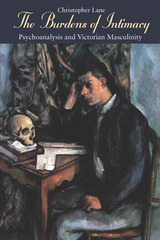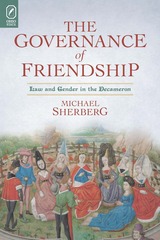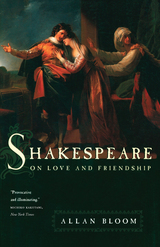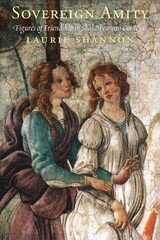7 books about Friendship in literature

The Burdens of Intimacy
Psychoanalysis and Victorian Masculinity
Christopher Lane
University of Chicago Press, 1998
Why does passion bewilder and torment so many Victorian protagonists? And why do so many literary characters experience moments of ecstasy before their deaths? In this original study, Christopher Lane shows why Victorian fiction conveys both the pleasure and anguish of intimacy. Examining works by Bulwer-Lytton, Swinburne, Schreiner, Hardy, James, Santayana, and Forster, he argues that these writers struggled with aspects of psychology that were undermining the utilitarian ethos of the Victorian age.
Lane discredits the conservative notion that Victorian literature expresses only a demand for repression and moral restraint. But he also refutes historicist and Foucauldian approaches, arguing that they dismiss the very idea of repression and end up denouncing psychoanalysis as complicit in various kinds of oppression. These approaches, Lane argues, reduce Victorian literature to a drama about politics, power, and the ego. Striving instead to reinvigorate discussions of fantasy and the unconscious, Lane offers a clear, often startling account of writers who grapple with the genuine complexities of love, desire, and friendship.
Lane discredits the conservative notion that Victorian literature expresses only a demand for repression and moral restraint. But he also refutes historicist and Foucauldian approaches, arguing that they dismiss the very idea of repression and end up denouncing psychoanalysis as complicit in various kinds of oppression. These approaches, Lane argues, reduce Victorian literature to a drama about politics, power, and the ego. Striving instead to reinvigorate discussions of fantasy and the unconscious, Lane offers a clear, often startling account of writers who grapple with the genuine complexities of love, desire, and friendship.
[more]

Communication and Women's Friendships
Parallels and Intersections in Literature and Life
Janet Doubler Ward
University of Wisconsin Press, 1993
Eleven original essays offer a variety of perspectives on the changing ways in which women's friendships have been viewed. The contributors discuss the fundamental values of women's friendships and communication in order to understand the many parallels and intersections between literature and life. This anthology suggests that women's friendships are to be greatly valued—indeed treasured —as significant parts of women's lives.
[more]

Friendship and Literature
Spirit and Form
Ronald A. Sharp
Duke University Press, 1986

The Governance of Friendship
Law and Gender in the Decameron
Michael Sherberg
The Ohio State University Press, 2011
The Governance of Friendship: Law and Gender in the DECAMERON by Michael Sherberg addresses two related and heretofore unexamined problems in the pages of the Decameron: its theory of friendship and the legal theory embedded in it. Sherberg shows how Aristotle’s Ethics as well as Thomas Aquinas’s Summa Theologica inform these two discourses, at the intersection of which Boccaccio locates the question of gender relations which is one of the book’s central concerns.
Through a series of close readings at all three levels of the text—the author’s statements, the frame narrative, and the stories themselves—Sherberg shows how Boccaccio exposes and explores gender tensions rooted in a notion of the patriarchal household, which finds its own rationale in the natural-law postulate of the inferiority of women. Relying on the writings of the great twentieth-century legal theorist Hans Kelsen, Sherberg demonstrates how through the complex architecture of the Decameron Boccaccio dismantles the logic of natural law, exposing it instead as a rhetoric used by men to justify their control of women.
The Governance of Friendship aims well to advance our understanding of Boccaccio as an intellectual: not only steeped in the key texts of his time, but also at the forefront of critical thinking about such issues as law and gender which will play out over the coming centuries and beyond.
Through a series of close readings at all three levels of the text—the author’s statements, the frame narrative, and the stories themselves—Sherberg shows how Boccaccio exposes and explores gender tensions rooted in a notion of the patriarchal household, which finds its own rationale in the natural-law postulate of the inferiority of women. Relying on the writings of the great twentieth-century legal theorist Hans Kelsen, Sherberg demonstrates how through the complex architecture of the Decameron Boccaccio dismantles the logic of natural law, exposing it instead as a rhetoric used by men to justify their control of women.
The Governance of Friendship aims well to advance our understanding of Boccaccio as an intellectual: not only steeped in the key texts of his time, but also at the forefront of critical thinking about such issues as law and gender which will play out over the coming centuries and beyond.
[more]

One Who Knows Me
Friendship and Literary Culture in Mid-Tang China
Anna M. Shields
Harvard University Press, 2015
The friendships of writers of the mid-Tang era (780s–820s)—between literary giants like Bai Juyi and Yuan Zhen, Han Yu and Meng Jiao, Liu Zongyuan and Liu Yuxi—became famous through the many texts they wrote to and about one another. What inspired mid-Tang literati to write about their friendships with such zeal? And how did these writings influence Tang literary culture more broadly? In One Who Knows Me, the first book to delve into friendship in medieval China, Anna M. Shields explores the literature of the mid-Tang to reveal the complex value its writers discovered in friendship—as a rewarding social practice, a rich literary topic, a way to negotiate literati identity, and a path toward self-understanding. Shields traces the evolution of the performance of friendship through a wide range of genres, including letters, prefaces, exchange poetry, and funerary texts, and interweaves elegant translations with close readings of these texts. For mid-Tang literati, writing about friendship became a powerful way to write about oneself and to reflect upon a shared culture. Their texts reveal the ways that friendship intersected the public and private realms of experience and, in the process, reshaped both.
[more]

Shakespeare on Love and Friendship
Allan Bloom
University of Chicago Press, 2000
"No one can make us love love as much as Shakespeare, and no one can make us despair of it as effectively as he does." William Shakespeare is the only classical author to remain widely popular—not only in America but throughout the world—and Allan Bloom argues that this is because no other writer holds up a truer mirror to human nature. Unlike the Romantics and other moderns, Shakespeare has no project for the betterment or salvation of mankind—his poetry simply gives us eyes to see what is there. In particular, we see the full variety of erotic connections, from the "star-crossed" devotions of Romeo and Juliet to the failed romance of Troilus and Cressida to the problematic friendship of Falstaff and Hal.
This volume includes essays on five plays, Romeo and Juliet, Anthony and Cleopatra, Measure for Measure, Troilus and Cressida, and The Winter's Tale, and within these Bloom meditates on Shakespeare's work as a whole. He also draws on his formidable knowledge of Plato, Rousseau, and others to bring both ancients and moderns into the conversation. The result is a truly synoptic treatment of eros—not only a philosophical reflection on Shakespeare, but a survey of the human spirit and its tendency to seek what Bloom calls the "connectedness" of love and friendship.
These highly original interpretations of the plays convey a deep respect for their author and a deep conviction that we still have much to learn from him. In Bloom's view, we live in a love-impoverished age; he asks us to turn once more to Shakespeare because the playwright gives us a rich version of what is permanent in human nature without sharing our contemporary assumptions about erotic love.
"Provocative and illuminating." —Michiko Kakutani, New York Times
"A brilliant analysis of the erotic ugliness and the balancing erotic grace of The Winter's Tale . . . and Bloom makes more sense of [Measure for Measure] than anyone else I have read." —A. S. Byatt, Washington Post Book World
At his death in 1992, Allan Bloom was the John U. Nef Distinguished Service Professor in the Committee on Social Thought at the University of Chicago. He is the author of several books, including Shakespeare's Politics (with Harry V. Jaffa) and The Closing of the American Mind.
This volume includes essays on five plays, Romeo and Juliet, Anthony and Cleopatra, Measure for Measure, Troilus and Cressida, and The Winter's Tale, and within these Bloom meditates on Shakespeare's work as a whole. He also draws on his formidable knowledge of Plato, Rousseau, and others to bring both ancients and moderns into the conversation. The result is a truly synoptic treatment of eros—not only a philosophical reflection on Shakespeare, but a survey of the human spirit and its tendency to seek what Bloom calls the "connectedness" of love and friendship.
These highly original interpretations of the plays convey a deep respect for their author and a deep conviction that we still have much to learn from him. In Bloom's view, we live in a love-impoverished age; he asks us to turn once more to Shakespeare because the playwright gives us a rich version of what is permanent in human nature without sharing our contemporary assumptions about erotic love.
"Provocative and illuminating." —Michiko Kakutani, New York Times
"A brilliant analysis of the erotic ugliness and the balancing erotic grace of The Winter's Tale . . . and Bloom makes more sense of [Measure for Measure] than anyone else I have read." —A. S. Byatt, Washington Post Book World
At his death in 1992, Allan Bloom was the John U. Nef Distinguished Service Professor in the Committee on Social Thought at the University of Chicago. He is the author of several books, including Shakespeare's Politics (with Harry V. Jaffa) and The Closing of the American Mind.
[more]

Sovereign Amity
Figures of Friendship in Shakespearean Contexts
Laurie Shannon
University of Chicago Press, 2001
Renaissance formulations of friendship typically cast the friend as "another self" and idealized a pair of friends as "one soul in two bodies." Laurie Shannon's Sovereign Amity puts this stress on the likeness of friends into context and offers a historical account of its place in English culture and politics.
Shannon demonstrates that the likeness of sex and station urged in friendship enabled a civic parity not present in other social forms. Early modern friendship was nothing less than a utopian political discourse. It preceded the advent of liberal thought, and it made its case in the terms of gender, eroticism, counsel, and kingship. To show the power of friendship in early modernity, Shannon ranges widely among translations of classical essays; the works of Elizabeth I, Montaigne, Donne, and Bacon; and popular literature, to focus finally on the plays of Shakespeare. Her study will interest scholars of literature, history, gender, sexuality, and political thought, and anyone interested in a general account of the English Renaissance.
Shannon demonstrates that the likeness of sex and station urged in friendship enabled a civic parity not present in other social forms. Early modern friendship was nothing less than a utopian political discourse. It preceded the advent of liberal thought, and it made its case in the terms of gender, eroticism, counsel, and kingship. To show the power of friendship in early modernity, Shannon ranges widely among translations of classical essays; the works of Elizabeth I, Montaigne, Donne, and Bacon; and popular literature, to focus finally on the plays of Shakespeare. Her study will interest scholars of literature, history, gender, sexuality, and political thought, and anyone interested in a general account of the English Renaissance.
[more]
READERS
Browse our collection.
PUBLISHERS
See BiblioVault's publisher services.
STUDENT SERVICES
Files for college accessibility offices.
UChicago Accessibility Resources
home | accessibility | search | about | contact us
BiblioVault ® 2001 - 2024
The University of Chicago Press









